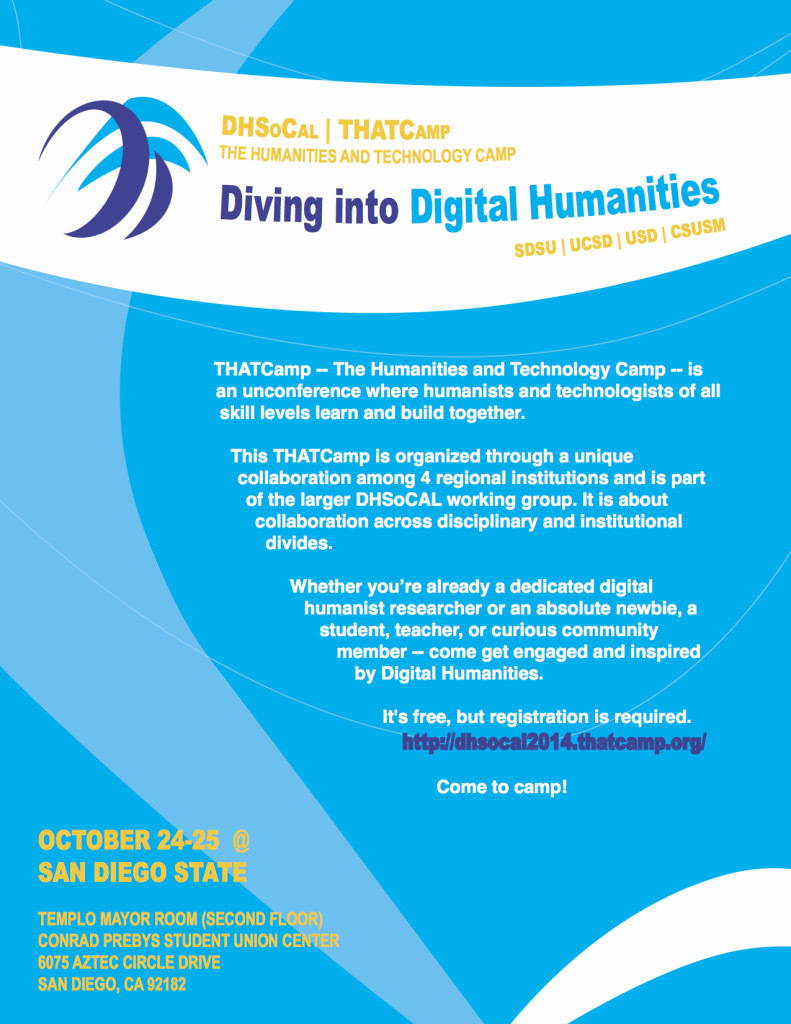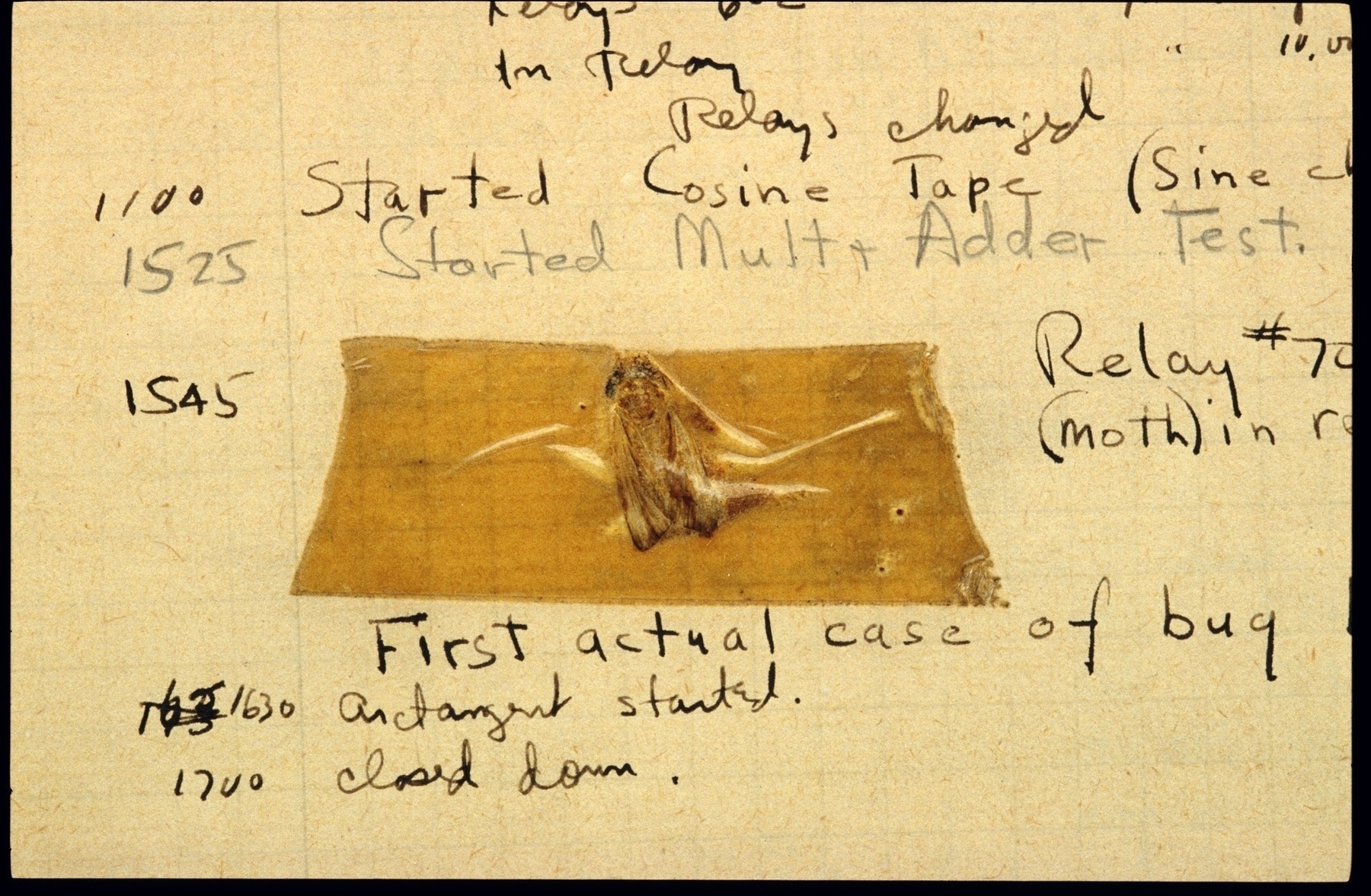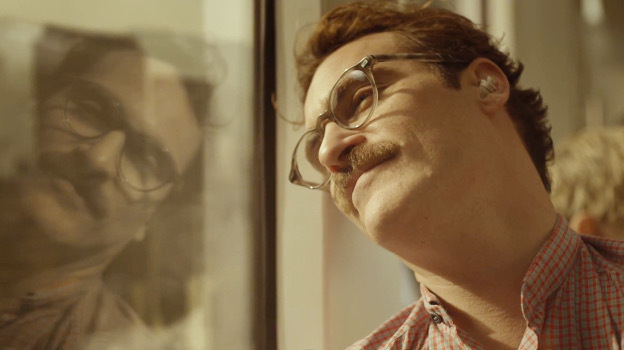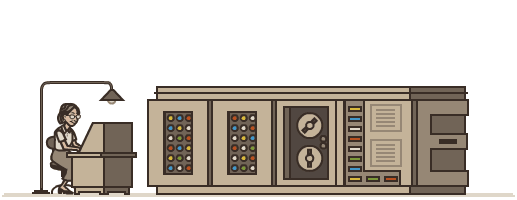2014
Cultural Studies Association - Critical DH Roundtable call for participants
Critical Digital Humanities is putting together a roundtable for this year’s Cultural Studies Association. The conference will be held from May 21-24, 2015 in Riverside, California at the Riverside Convention Center. This year’s theme is Another University Is Possible: Praxis, Activism, and the Promise of Critical Pedagogy. In keeping with this year’s theme, we would like to explore the question “What does critical digital humanities look like?” The goal of this roundtable is to open a dialogue about critical approaches to digital humanities. Each participant will give a brief 5-7 minute provocation followed by a discussion.
Some topics for consideration, but not limitation:
- critical approaches to digital pedagogy, big data projects, data visualization, and digital scholarship
- specific campus initiatives, classes or programs that fall under the category of “critical digital humanities”
- limitations of critical digital humanities
- theory vs. practice in DH
- cultural studies and DH
- public scholarship, public humanities, and public history
Building off of the terrific energy from THATCamp, we would like to invite the DHSoCal community to consider having a role in this conversation! If you are interested, please contact http://cdh.ucr.edu/ and let us know what you are interested in discussing by Dec 1, 2014.
(Revised and republished April 23rd, 2025)
All Things Digital at UCR
At a few recent meetings we’ve talked about the new digital projects and resources being developed at UC Riverside, as well as other opportunities for graduate students and faculty interested in digital humanities.
Digital Scholars Lab
The UCR Rivera Library will be opening a new Digital Scholars Lab in the coming months. Over the Summer and Fall quarters, I’ve been working for the library as an advisor on digital scholarship projects and digital humanities in general. Once the Lab is open it will be a meeting place for graduate students, researchers, and faculty to start new digital scholarship projects or get help with existing ones. Although the Lab isn’t officially open at the moment, the Library is still happy to work with scholars and has many resources available. I’ve also made a website as a place to keep my notes for the development of the Lab. The website is a work in progress and it is not the official Lab website, but it does list many resources on digital scholarship and digital humanities: scholarslab.net
THATCamp DHSoCal
THATCamp DHSoCal: Diving into Digital HumanitiesOctober 24th and 25th, 2014 San Diego State University
THATCamp is “The Humanities and Technology Camp,” and it is an “un-conference” meeting where humanists and technologists of all skill levels learn and build together in sessions proposed on the spot.
THATCamp DHSoCal: Diving into Digital Humanities will be held at San Diego State University, but it is organized through a unique digital humanities-style collaboration between 4 regional institutions: San Diego State University (SDSU), University of California at San Diego (UCSD), California State University at San Marcos (CSUSM), and University of San Diego (USD).
Visit http://dhsocal2014.thatcamp.org/ for more information and to register online. It is free and open to the public.
The spirit is inclusive, so, please send this email far and wide—to anyone (colleagues, students, friends) interested in learning about the digital humanities, getting involved in regional collaborations, and geeking out on the intersection between traditional humanities and digital technologies.
Join us to dive into the digital humanities!
More information on the DHSoCal digital humanities group can be found at: http://dhsocal.blogspot.com

(Revised and republished April 19th, 2025)
Digital Pedagogy workshop for TAs
Ever wondered what digital pedagogy is? Want to know what it’s like to teach online?
Wonder no more.
On February 19th, 2014, join us for an introductory session on digital pedagogy.
We will introduce you to the LMS (Learning Management System) Canvas, and we'll show you some of the applications that make online teaching as good (and sometimes better) than face–2-face teaching. We’ll also discuss some of the best practices for online education in the physical classroom and in the virtual one.
Location: UC Riverside, Surge 170
Date and time: Wednesday February 19th, 2014. 4–6PM
This is the first of hopefully many sessions aimed at training graduate students (and anyone else) in digital pedagogies.
(Revised and republished April 19th, 2025)
Notes on TEI and Markup Fundamentals workshop
My post at Critical Digital Humanities on a recent workshop: TEI and Markup Fundamentals http://cdh.ucr.edu/2014/02/16/notes-on-tei-and-markup-fundamentals-workshop/
On February 13th I attended a workshop on TEI and Markup Fundamentals sponsored by the Graduate Quantitative Methods Program. The workshop was given by Rochelle Gold and Kimberly Hall from the Department of English at UC Riverside.
TEI (Text Encoding Initiative) is a method of encoding texts with markup language for digital representation. TEI markup focuses on rendering the semantic qualities of texts more visible. For example, sentences and clauses can be marked within a text, as well as the lines and features of a poem. This granular level of encoding allows for digital representations of these texts to carry details and information beyond their normal forms, which is valuable for critical interpretation.
→ read more at the original post
(Revised and republished April 19th, 2025)
Event Archive: Rethinking Debates on Digital Learning . 12 Feb 2014
My post at Critical Digital Humanities on a recent talk:
CDH Event Archive: Rethinking Debates on Digital Learning
Yesterday CDH sponsored a talk by Professor Juliette Levy of the Department of History at UC Riverside. In her discussion, Professor Levy described her own evolution toward using digital technology in order to broaden the learning experience for her students.
Professor Levy’s talk began with a common experience many in academia have shared — traditional methods of teaching are not being adapted to the changing needs of students in our modern world.
The RSA talk by Sir Ken Robinson, which was turned into an animated video, was central to describing this need for change. There is a great chasm between the needs of students and the pace of innovation within the classroom.
→ read more at the original post
(Revised and republished April 19th, 2025)
Notes on Virtual Lectures
The virtual lecture that Professor Levy gave to her CHASS F1RST class on Monday went very well. This was the first time we attempted to produce a virtual lecture, and I’ve compiled some notes on the process and our experience.
1. The setup will take 5–10 minutes.
Professor Levy and I had both done Google Hangouts before, but never for such a large audience. Just connecting the laptop to the projector can take a minute or two, and then there’s the webcam, and the initiation of the Google Hangout. In order to keep students engaged during all this, I played the “#Hashtag” video with Jimmy Fallon and Justin Timberlake. The idea here was to inject a little humor, and also consider digital technology as a theme for the lecture. After the video, Judy (the TA), addressed the class and let them know about the video conferencing aspect via Google Hangouts.
Virtual Lectures and the Digital Classroom
This winter quarter I am a research assistant working on digital pedagogy and instruction at UC Riverside for Professor Juliette Levy. The class consists of about 60 students, and it’s a CHASS F1RST Humanities Course (Wayback Machine link) covering the history of Latin America. Even though this is a regular in-class course, we’re using a variety of digital tools to help broaden the learning experience. These tools, which are helpful for managing the class itself and also creating real interaction between students, include:
Moth in Relay
In 1947 a moth was found in a relay switch on the Mark II electromechanical computer, a true computer "bug." What's most interesting here isn't that an insect was found in the machine, but that the computer operator taped the moth into the logbook. It's almost as if the moth was trapped in a thin sheet of amber, preserved as the pre-digital ancestor of the tricksters within our own modern devices.

The insect was found by Grace Hopper (Wayback Machine link), a computer scientist and rear admiral in the US Navy. Google recently paid homage to Hopper with a "doodle" (below) showing her working on an early mainframe computer. Not only does the computer display an answer on a paper printout, but a moth also flies out at the end of the sequence.
(Revised and republished April 19th, 2025)

